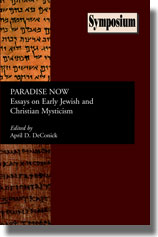
$52.00
A substantial introduction to the study of early Jewish and Christian mysticism, this volume examines major aspects of the mystical tradition within early Judaism and Christianity. This tradition was centered on the belief that a person directly, immediately, and before death can experience the divine, either as a rapture experience or one solicited by a particular praxis. The essays define and analyze the nature and practices of mysticism as it emerges within early Judaism and Christianity, recognizing this emergence within a variety of communal environments. Larger questions about the relationship between hermeneutics and experience, as well as the relationship between mysticism and apocalypticism are also discussed, and a substantial bibliography of the field is provided. The book is the result of ten years of work of the Early Jewish and Christian Mysticism unit of the Society of Biblical Literature.
April D. DeConick is Isla Carroll and Percy E. Turner Professor of Biblical Studies at Rice University in Houston. She is the author of Voices of the Mystics: Early Christian Discourse in the Gospels of John, Thomas and Other Ancient Christian Literature; Recovering the Original Gospel of Thomas: A History of the Gospel and Its Growth; and The Original Gospel of Thomas in Translation: With a Commentary and New English Translation of the Complete Gospel (all from T&T Clark). She is an active member of the Society of Biblical Literature where she was one of the founders of the Early Jewish and Christian Mysticism Group and currently serves as co-Chair of the New Testament Mysticism Project.
“This volume will be of interest not just to specialists, but to biblical scholars in general. It maps out a new paradigm for analysing mystical texts and in its several essays offers rich veins of research. This is a highly significant volume.”
— Paul Foster, Expository Times
“Celebrating the tenth anniversary of the Early Jewish and Christian Mysticism group of SBL, this book is a collection of essays presented in those sessions over the years. As such, it is a substantial and welcome contribution from an important group within SBL, and readers will not be disappointed in the quality of essays included here. … The studies in this volume explore a wealth of diverse types and traditions of religious literature, and they deploy a similarly intriguing diversity of analytic methods to this end. Various authors take up the question of performance, theories of ritual, textual transmission and cultural memory, gender theory, and topics of the spatiality of experience and its relation to textualization. Readers will find here a provocative mapping of types, texts and analytic models for the interpretation of mystical experience within early Jewish and Christian groups.”
— Ward Blanton, Journal for the Study of the New Testament
What Is Early Jewish and Christian Mysticism?
—April D. DeConick
Religious Experience and the Construction of the Transcendent Self
—Alan F. Segal
Visionary Experience in Ancient Judaism and Christianity
—Christopher Rowland, with Patricia Gibbons and Vicente Dobroruka
Performative Exegesis
—Seth L. Sanders
The Emergence of the Mystical Traditions of the Merkabah
—Rachel Elior
The Ancient Jewish Apocalypses and the Hekhalot Literature
—James R. Davila
Rabbi Ishmael’s Priestly Genealogy in Hekhalot Literature
—Ra‘anan S. Boustan
The Temple Within
—Christopher R. A. Morray-Jones
God’s Face in the Enochic Tradition
—Andrei A. Orlov
Wheels of Time in the Apocalypse of Jesus Christ
—Cameron C. Afzal
Sexuality and Gender of Angels
—Kevin Sullivan
Lessons on Early Jewish Apocalypticism and Mysticism from Dream Literature
—Frances Flannery-Dailey
Situating the Afterlife
—Kelley Coblentz Bautch
Eschatological Sorrow, Divine Weeping, and God’s Right Arm
—Rebecca Lesses
The Therapeutae, Text Work, Ritual, and Mystical Experience
—Celia Deutsch
Jewish and Christian Heavenly Meal Traditions
—Andrea Lieber
Baptismal Praxis and Mystical Experience in the Book of Revelation
—Charles A. Gieschen
Divine Secrets and Divination
—Daphna Arbel
